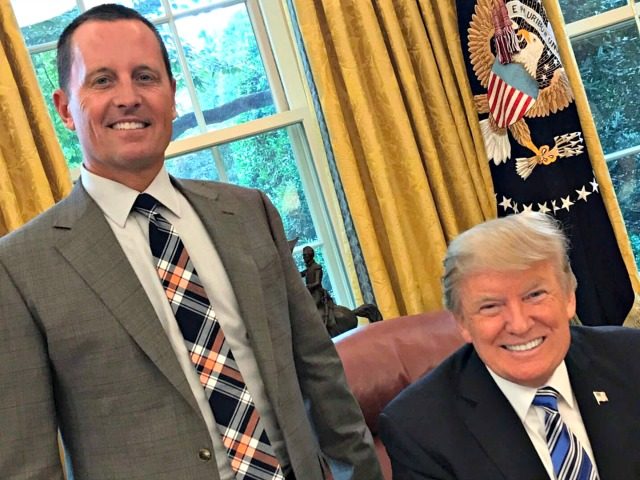The U.S. Senate confirmed Richard Grenell, former Mitt Romney campaign spokesman and communications director for John Bolton when he served as U.S. ambassador to the U.N., as U.S. ambassador to Germany Thursday.
The Senate voted 56 to 42 to confirm shortly after 2:00 p.m. Eastern time.
Democrat Sen. Joe Manchin (D-WV) crossed party lines Thursday morning, ensuring Grenell’s confirmation would not need a tie-breaking vote from Vice President Mike Pence. Sens. Heidi Heitkamp (D-ND), Joe Donnelly (D-IN), Jon Tester (D-MT), and Claire McCaskill (D-MO), all facing reelection in “red” states, also joined a unanimous Republican caucus in supporting Grenell.
Other Democratic caucusing senators like Bill Nelson (D-FL) and Angus King (I-ME), who had voted to confirm Mike Pompeo as secretary of state earlier in the day, refused to support Grenell.
President Donald Trump nominated Grenell to be the highest American diplomatic representative in Europe’s largest economy in September, but as with many of Trump’s top picks, Grenell’s confirmation process was fraught with delays and controversy. As recently as Monday, Senate Democrats were reportedly holding up Grenell’s vote, prompting a frustrated mention by the president in a tweet:
The latest delays followed months of Democratic agitation about Grenell’s alleged “misogyny,” apparently over now-deleted tweets in which he wrote things like that MSNBC anchor Rachel Maddow “needs to take a breath and put on a necklace” and that “Hillary is starting to look like Madeleine Albright.”
“I cannot in good faith support a nominee who has a lengthy track record of tweets attacking both prominent Democratic and prominent Republican women,” Sen. Jeff Merkely (D-OR) said last month on the Senate floor, for example.
The campaign against Grenell, however, fits into a wider pattern of Democratic opposition to Trump’s nominees, including Secretary of State nominee Mike Pompeo, also confirmed today, and various judicial picks.
The Senate’s vote Thursday made Grenell the first openly gay U.S. ambassador to Germany and the most senior openly gay executive official in American history, bringing to a close a months-long campaign on his behalf by both conservatives and gay Republican activists. In the U.S. order of precedence, ambassadors rank significantly higher than other posts previously held by openly gay men, including President Barack Obama’s Army Secretary Eric Fanning. Presidents Bill Clinton, George W. Bush, and Barack Obama appointed a number of openly gay ambassadors – none, however, to as prominent postings as Germany, the world’s fourth largest economy.
The unity of voices of the Right behind him in 2018 stands in stark contrast to six years ago, when he was forced to resign from then-presumptive GOP presidential nominee Romney’s campaign after a public furor over his homosexuality and unrepudiated support for same-sex marriage. His former boss, Bolton, now Trump’s National Security Advisor, came to his defense at the time, telling radio host Aaron Klein:
I think it’s a loss to the campaign. I think it’s a loss for him. And it’s too bad that we live in the kind of environment where it’s hard to make purely professional judgements about people and have them participate in the campaign on that basis.
The impression that some people are trying to give that somehow the Romney campaign bowed to pressure from social conservatives, or that reflects a bias against gays and lesbians is just absolutely wrong. But using a personal situation like this for those kinds of political purposes is I think an unfortunate aspect of contemporary American politics.
With Grenell’s confirmation, eight of the ambassadorships to the ten largest economies in the world are filled by Trump appointees. Peter Michael McKinley, the career diplomat appointed ambassador to Brazil by President Obama, remains in his post. Admiral Henry Harris is expected to get Trump’s nomination for ambassador to South Korea imminently.

COMMENTS
Please let us know if you're having issues with commenting.